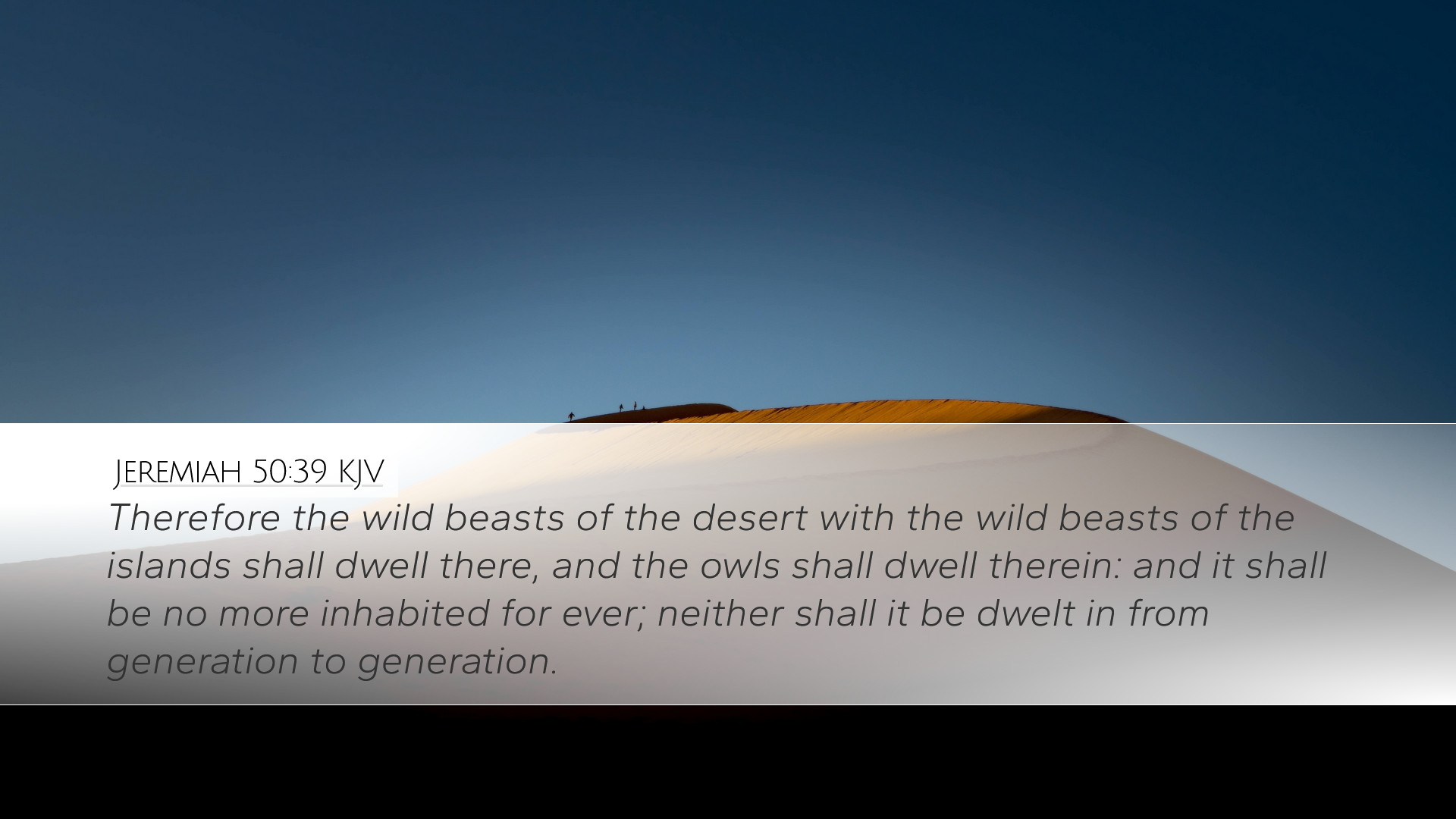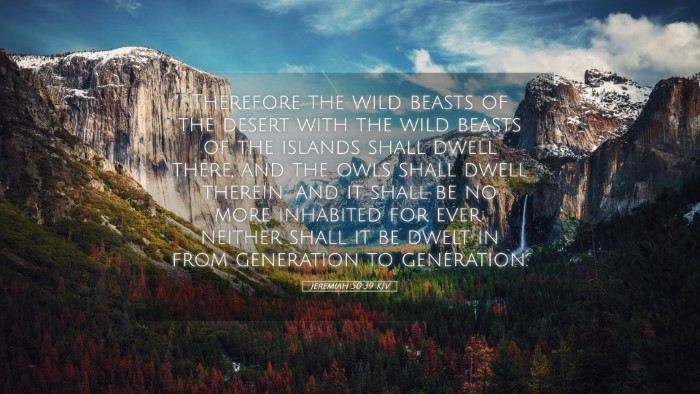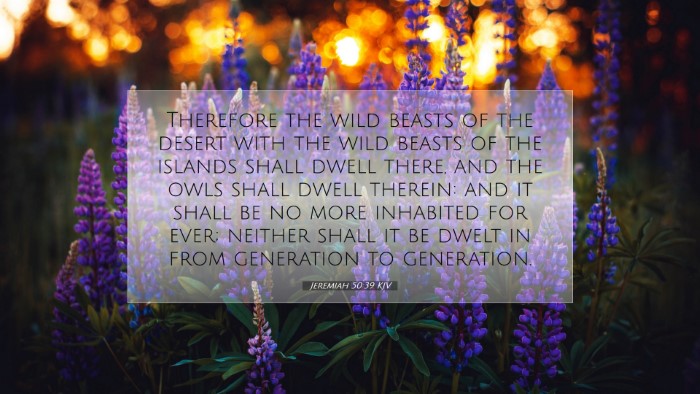Commentary on Jeremiah 50:39
Verse Context: Jeremiah 50:39 states, “Therefore the wild beasts of the desert with the wild beasts of the islands shall dwell there, and the owls shall dwell therein: and it shall be no more inhabited for ever; neither shall it be dwelt in from generation to generation.” This verse is situated within a prophecy concerning the fall of Babylon, symbolizing divine judgment and the desolation that follows.
Overall Theme of Desolation
This verse is a profound declaration of God’s judgment, portraying the complete desolation of a once-great city. Scholars across various commentaries have approached this theme by highlighting the consequences of sin and the inevitable downfall of those who stand against God.
Matthew Henry’s Insights
Matthew Henry in his commentary elaborates on the symbolic use of wild beasts to illustrate the abandonment of Babylon. He emphasizes that the presence of wild animals indicates a return to a state of wilderness, devoid of human life and civilization. Henry states:
“The desolation signifies not only destruction but also a state of utter forsakenness where nature takes over the ruins of human pride.”
Henry elucidates the thematic element of abandonment as reminiscent of other prophetic declarations found in Isaiah (Isaiah 13:19-22) and reinforces the notion that such desolation is a direct result of divine judgment against iniquity.
Albert Barnes’ Perspective
Albert Barnes offers a detailed analysis of the imagery employed in Jeremiah 50:39. He comments on the specific mention of “wild beasts” and “owls,” suggesting these creatures signify a complete transformation of the land from a thriving city to a mere haunt for animals:
“This transformation speaks volumes of the utter desolation wrought by divine justice; it mirrors the fate that awaits any nation that defies the Creator.”
Barnes stresses the finality of the phrase “it shall be no more inhabited for ever,” drawing attention to the perpetual nature of God’s judgment. He references historical accounts of Babylon’s decline to underscore that such prophetic utterances often bear significant weight in their literal application to nations and cities.
Adam Clarke’s Analysis
Adam Clarke approaches this verse from a perspective of historical and cultural context. He reflects on the significance of Babylon as a center of power and influence, stating:
“The fall of Babylon marks not just the physical destruction but the collapse of the moral and spiritual essence that once defined it.”
Clarke suggests that the desolation foretold in the prophecy serves as a stark warning to contemporary powers. He highlights the biblical principle that nations built on corruption and idolatry inevitably face divine retribution.
Theological Implications
The theological implications of Jeremiah 50:39 can offer deep insights into the nature of sin, punishment, and the character of God. Biblical scholars often discuss the recurring motif found throughout scripture—God’s sovereignty over nations and His ultimate authority in enacting justice.
- Divine Sovereignty: This verse illustrates the sovereignty of God over human institutions. It supports the notion that God will not allow injustice, oppression, or corruption to remain unchecked indefinitely.
- Consequences of Sin: The text serves as a reminder of the serious consequences that follow national sins. Just as Babylon fell, so too can any entity that strays from the path of righteousness.
- Hope Amidst Judgment: While the verse speaks of desolation, it also provides a deeper insight into God's redemptive plans that follow judgment—signaling an eventual restoration that can emerge from destruction.
Historical Context
Understanding the historical backdrop against which Jeremiah wrote can enrich the interpretation of this verse. Babylon was not only the capital of the Babylonian Empire but also a symbol of human pride and rebellion against God. The prophecies in Jeremiah, especially those relating to Babylon's downfall, encourage believers to reflect on the nature of God's justice and the futility of opposing His will.
As these creatures are depicted taking over the desolate land, they represent a reversal of fortunes—the powerful city becomes a barren wilderness, isolated from the blessings of God. Historical accounts affirm the prophetic words of Jeremiah, attesting to the eventual desolation that befell Babylon, making the prophecy a significant point of reflection for modern spiritual leaders.
Conclusion
Jeremiah 50:39 serves as a profound illustration of the consequences of sin and the inevitability of divine judgment. Through careful examination of public domain commentaries by Matthew Henry, Albert Barnes, and Adam Clarke, the verse emerges as a timeless warning to nations and individuals alike. The desolation of Babylon invites scholars, theologians, and pastors to consider the long-standing truth that sin will not go unnoticed and that God’s justice will ultimately prevail.


